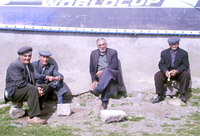While the political powers are discussing how to make teams for the elections, how to criticize the other powers, certain processes are happening in the world that may break all their plans. This concerns not only sanctions against Iran but economic processes in the world. The World Bank has published its report entitled Global Economic Prospects 2012: Uncertainties and Vulnerabilities.
The World Bank has reduced its predictions concerning the Euro zone almost twice, and for the world economy – by one point. According to this publication, the growth of the world economy will be by 2.5% (the prediction was 3,6% six months ago). The Euro zone economy can be cut down by 0,3% instead of the expected 1,8% growth.
If there are optimists who think that we are out of the world tendencies and our system is more or less closed and cannot be hit by the crisis, the WB informs that the crisis will first of all hit the developing countries. It would be correct to say that the processes have already hit the developing countries. First, the stock exchange markets of countries in transition have had a slump at 8.5% (compared to July 2011). Second, the WB assures that the inflow of capital to developing countries has been cut down because starting from the second part of the last year investors have started to take their resources out of developing markets. However, as it feels the worst times have yet to come. The WB mentions that their team cannot forecast the results that may be reached in 2012 but is sure in several things. They are sure that currently the economies of developing countries are more vulnerable than in 2008. “If the economic situation in countries with high incomes becomes worse and the new world crisis comes true, the economies of developing countries will have to resist the crisis with less capital, trade opportunities and resources to stimulate economic activity on part of the state. In these conditions the economic development opportunities that were feasible before are more difficult now. The problems that have not been solved so far during the economic growth processes will be more difficult to solve later. In such uncertain conditions the developing countries should evaluate their vulnerable sides and prepare exit plans for economic slump,” writes the report of the World Bank.
This means that the assurances of state officials that during the first wave of crisis they were not experienced and now they are experienced enough will not help them. There were even announcements about lessons learnt from the crisis. People may recall the prime-minister saying that the crisis of 2008-2009 gave lessons and one of the lessons is the existence of the criminal and monopoly groups, the economy is not diversified and mainly depends on the sector of construction, the export depends on the mining sector, etc. These are the problems that according to the WB have been revealed but not solved. The GDP proportion has changed, but it was not due to the growth of the production and other sectors but the slump of the construction sector. The main products of export still continue to be the mining products. As for the government’s speeches about the oligarchic system, these are only words and nothing more.
Concerning the possible impact of a new international crisis on economies like Armenia the WB writes the following: “Serious crisis in countries with high incomes can result in pressure on the payment balance and accounts of countries that mostly depend on the mining sector export and money inflow.” This is typically concerning Armenia. The WB mentions that the impact can be deeper for countries where the money transfers from other countries are more than the 10% proportion of the GDP. In Armenia this rate is more than 11%. For example, in 2010 this rate was equal to 11.3% (money transfers were equal to 1.07 billion dollars, and the GDP was equal to 9.4 billion dollars).
These risks highlighted by the WB are no news for the government. The government highlighted the possible risks in the budget notes for 2012. “If the prices of oil and gas continue falling due to the negative expectations of the market participants, it will eventually impact the Russian economy. As a result of that influence the money transfers and investments from Russia in Armenia will be cut down resulting in smaller GDP. If the prices of metals are lower in 2012 (as a result of lower economic growth of Asian countries and reduced demand on part of the European and American markets), it will result in less export of metals from Armenia, thus resulting in reduction of the GDP.” This sentence has been taken from the sections of risks in the government’s message to the budget 2012. The WB’s prediction, according to which the prices of mining sector products will go down by 9.3% (in 2011 those grew by 20.7%), and the price for one barrel of oil will go down to 98.2 dollars from 104 dollars in 2011. Based on these estimations, the risk evaluation of the government mentioned above is not a set of risks but possible scenarios of development. In case of such scenarios a number of data and indicators are under question, and first of all it is a very big question whether the government will be able to collect more taxes by 101 billion drams.

